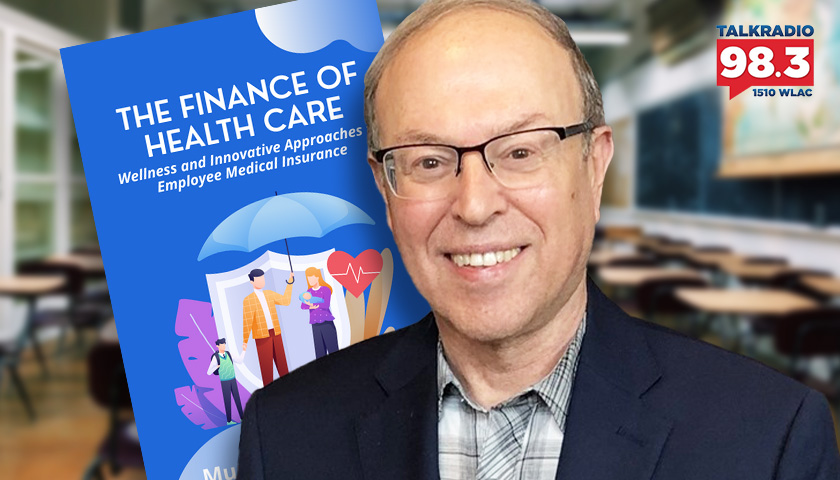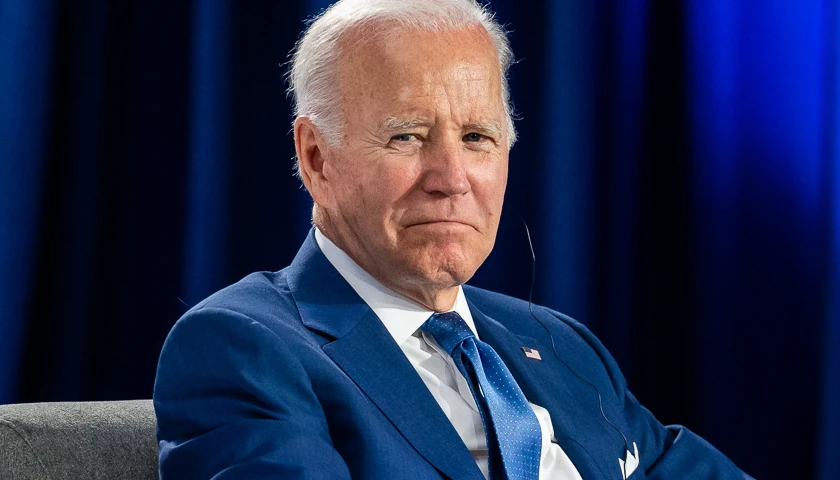Live from Music Row, Tuesday morning on The Tennessee Star Report with Michael Patrick Leahy – broadcast on Nashville’s Talk Radio 98.3 and 1510 WLAC weekdays from 5:00 a.m. to 8:00 a.m. – host Leahy welcomed libertarian, professor, and author Dr. Murray Sabrin to the newsmaker line to discuss his new book, The Finance of Health Care, and his thoughts on how to fix the American economy.
Leahy: On our newsmaker line right now, Dr. Murray Sabrin, a professor of finance at Ramapo College in New Jersey. He is the author of a new book. The book is The Finance of Health Care. Welcome, Dr. Sabrin. Thanks for joining us today.
Sabrin: Thank you, Michael. It’s a pleasure to be with you.
Leahy: So, Dr. Murray Sabrin, you’re a libertarian. You ran for governor of New Jersey, 1997, on the Libertarian ticket, is that right?
Sabrin: That’s correct. I was the first third-party candidate to raise enough funds, which allowed me to get matching funds from the state of New Jersey, which required me to be in two debates with the Democrat and Republican candidates.
And the Republican at that time was incumbent Governor Christine Whitman and the Democrat was Jim McGreevey, who won the governorship four years later.
Leahy: Now, what’s interesting, just maybe a coincidence, so Murray Sabrin is your name, your first name is Murray, as in Murray Rothbard, who also had the same first name, the great libertarian writer. Has anybody commented on that previously?
Sabrin: Well, it’s one of those great coincidences in life that we both have the same name, we were born 20 years apart, that we both grew up in New York City.
I first met him in 1974 and I invited him to be a member of my dissertation committee when I was at Rutgers studying for my PhD.
And my dissertation was based upon something he wrote in his economic treatise Man, Economy, and State, about how inflation spreads through the economy.
And that was the basis of my dissertation, of how prices affect local economies. And we’re seeing it happening right before our eyes, where we see some cities like Tampa, Florida, has the highest inflation rate in the country because housing prices have skyrocketed here in Southwest Florida.
So inflation is basically a microphenomenon and then it’s caused, as we all know, as we should know, by the Federal Reserve just printing endless money for the past several decades.
Leahy: I could tell that you had a connection to Murray Rothbard, not just your first name, because your website, MurraySabrin.com, says “abolish legal plunder, end the empire, restore civil liberties.” That sounds a lot like Murray Rothbard.
Sabrin: Well, he was one of the giants, the insightful giants of the 20th century. Unfortunately, he passed away at age 68 in 1995 when my first book came out, Tax Free 2000, which is based upon his insights and other libertarian and Austrian economist insights about how do we create a free and prosperous society with social harmony.
And that’s basically by getting the government out of the way so men and women entrepreneurs can do what they do best, which is provide goods and services that people want. The government doesn’t provide us with what we want, otherwise we’d all be happy, and we would be happy to pay our taxes.
But we are not happy to pay our taxes because people grumble about taxes, especially in New Jersey, they’ve been grumbling about property taxes since we first moved to the state in 1977.
Now we’re in Southwest Florida, where we don’t have a state income tax, we have fairly modest property taxes, and the state functions magnificently.
Leahy: Now, are you still affiliated with Ramapo College in New Jersey?
Sabrin: No, I retired two years ago. The only affiliation I have is my wife and I helped fund the Sabrin Center for Free Enterprise. So they’re doing their thing now to promote free enterprise ideas with students.
When I was there, I would invite speakers from across the political spectrum to debate these great issues about philanthropy and social entrepreneurship, and trade and taxation, and government spending and education, to give students and faculty and the general public different perspectives on these issues.
And we know that a robust debate on the issues throughout society, especially at the college level, is vital for a functioning democracy.
Leahy: Now, let me ask you this. Along the way, I think you made some money somewhere. Did you make it in real estate? How did you make your money?
Sabrin: Well, we’ve just been investing. I mean, one of the beautiful things about being a college professor is that you have TRS, the college Teacher Retirement System, and we socked our money away as much as possible.
And that money grew over time, because one of the impacts of the effects of Federal Reserve policy is that asset prices go up over time. And when you have a 35-year career in education and you put a lot of your income away, it’s going to grow and compound over 35 years.
Leahy: Now, natural question here. Are you at all affiliated with the Mises Institute for Austrian Economics, headquartered in Auburn, Alabama? Your mentor, Murray Rothbard, was very much affiliated with that group. Do you work with them at all?
Sabrin: I don’t have an official affiliation. I’ve written articles for them which they published over the years. I’m also a financial contributor from day one, when it was founded 40 years ago in 1982. And to me, the Mises Institute was an integral part of my intellectual development.
In addition, they provided enormous resources when I taught financial history of the United States, securities investments, and other courses which allowed me to bring in the perspectives of the Austrian economists, to show how the economy really works and why we have these consistent, constant boom-and-bust cycles. And that was the theme of my book from last year of Navigating the Boom/Bust Cycle.
Leahy: You have a new book coming out, I think. The Finance of Health Care: Wellness and Innovative Approaches to Employee Medical Insurance. Tell us about that book.
Sabrin: Well, this is the second book I’ve written for Business Experts Press, which is a publisher that provides how-to books for the business community. And this book goes into all the different components of medical care, which is named health care in the United States.
But it’s really medical care, because we pay for getting medical services. And so what I do in this book, which is coming out probably in about a month and a half or so, is go over all the different opportunities for employers to get medical care for their employees, and to give them alternatives to traditional medical insurance.
And I’m just finishing reading the proof of the manuscript, and it’s a very tight 100-plus-page book that’s sort of a handbook for entrepreneurs and business decision-makers to decide what’s the best medical benefit for their employees so they can keep their costs down and employees are happy with good quality medical care, and it’s a win-win situation.
Leahy: I’m looking at the American economy today, the American political system, what would be the number one thing you would do to fix it?
Sabrin: Well, obviously the Federal Reserve should stop manipulating interest rates. That’s been the problem for decades. They pump money into the system, drive interest rates down, create an artificial boom.
Then when inflation accelerates like it has the past year and a half, they throttle back, they raise interest rates, and you get a bust. This is what the Austrian-school insight is about, how the Central Bank and Federal Reserve causes the boom/bust cycle.
So that’s the first thing I would do. The second thing I would do is reduce government spending and free up the economy with resources that go to the private sector, which is the engine of economic growth, not government spending.
Leahy: Tell us a little bit about your personal life. You came here to the United States at the age of 12. Where were you born and how did you get here?
Sabrin: I was born in West Germany after World War II. My parents were the only ones in their families to survive the Holocaust. And so my parents made the decision to come to America, because my father’s mother grew up in America and then went back to her native Poland when she was, I guess, a teenager.
So I came here in 1949 at the age of 2 and a half. I became a U.S. citizen at 12 and a half, and I take my oath to defend the Constitution very seriously. I wish members of Congress, the president, and the Supreme Court justices took that oath as seriously as I do, because otherwise, you wouldn’t have this huge welfare-warfare state that we have today.
I began my career as a New York City public school teacher, realized that this was not going to be my future, went to graduate school in the 1970s, and my autobiography is coming out very soon also, which describes in detail how I went from a liberal Democrat in the 1960s, growing up in Bronx, New York, to, I would say a hardcore libertarian by the early 1970s.
Listen to today’s show highlights, including this interview:
– – –
Tune in weekdays from 5:00 – 8:00 a.m. to The Tennessee Star Report with Michael Patrick Leahy on Talk Radio 98.3 FM WLAC 1510. Listen online at iHeart Radio.





